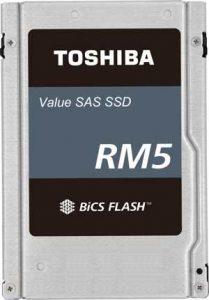Toshiba Memory: Availability of RM5 Series of vSAS 2.5-Inch SSDs on HPE ProLiant Servers
From 960 to 7,680GB, up to 838MB/s and to 650MB/s sequential RW, 150,000 IO/s, and 50,000 IO/s random RW
This is a Press Release edited by StorageNewsletter.com on April 18, 2019 at 2:29 pmToshiba Memory America, Inc. (TMA), the U.S.-based subsidiary of Toshiba Memory Corporation, announced the availability of its RM5 Series of value SAS (vSAS) SSDs on HPE (Hewlett Packard Enterprise Development LP) ProLiant servers.
The company is the first to introduce vSAS – a class of SSD that is expected to replace enterprise SATA SSDs in server applications.
SAS SSDs deliver performance, capacity, manageability, reliability, and data security at omparable price points. RM5 SSDs are single-ported versions of the company’s enterprise SAS product family and provide higher performance per slot than competing SATA SSDs, thus enabling better utilization of system resources under I/O intensive workloads.
Since the SATA interface is performance-limited, no future advancements are planned on its roadmap. In many data-intensive environments, SSDs based on SATA have become a bottleneck to servers, preventing the CPU from performing required operations or transactions in a timely manner. This under-utilization of the server’s compute capabilities can also affect the number of users that can be serviced at one time. Because SATA was designed as a lower cost interface for consumer-grade HDDs, its 6Gb interface, half-duplex transmission, limited queue depths, and restrictive protocol means that it cannot leverage the full capabilities of flash memory.
The RM5 Series delivers twice the interface speed of SATA, with full-duplex 12Gb/s links. The drives utilize 64-layer BiCS FLASH TLC (3-bit-per-cell) 3D flash memory developed by the firm.
Available capacities range from 960GB to 7,680GB (1). The products support superior bandwidth and IO/s than SATA including, sequential reads up to 838MB/s, sequential writes up to 650MB/s, random reads up to 150,000 IO/s, and random writes up to 50,000 IO/s (2). Compared to typical enterprise SATA SSDs, the RM5 Series is about 2x faster under mixed R/W workloads (3).
“In our system-level OLTP benchmarking (4), RM5 SSDs deliver 25% higher application-level performance at up to 85% lower transactional latency than SATA SSDs,” said Jeremy Werner, SVP and GM, SSD business unit, Toshiba Memory America. “By replacing SATA drives with vSAS drives in servers, HPE customers can realize improved system-level performance per dollar.“
“We are committed to improving application performance for our customers and with the HPE ProLiant servers, we are delivering secure, software defined compute that delivers the speed, scale and economics needed for hybrid cloud deployments,” said Shin-Wen Kuo, VP, workloads and server options, HPE. “Through our collaboration with Toshiba Memory to integrate its SAS server storage solution with HPE ProLiant servers, we are enabling customers to upgrade from SATA to SAS performance at an affordable price point while leveraging their existing server infrastructure.“
Providing data security and reliability, the RM5 Series offers FIPS 140-2 Level 2 certification and supports various levels of security features including Self-Encrypting Drive (SED) and Sanitize Instant Erase (SIE) configurations. These value SAS SSDs are compatible with most sockets that SATA SSDs are used in today, making them valuable to enable hardware-based RAID configurations. Since the majority of ProLiant servers include a SAS HBA or RAID card, SAS and SATA SSDs can be used in the same drive bay, making it a performance upgrade.
The RM5 Series of value SAS SSDs is available in HPE ProLiant servers and is priced to compete with enterprise SATA SSDs – at a lower cost than mainstream SAS SSDs.
Read also:
Toshiba Memory RM5 12Gb SAS 7.68TB 2.5-Inch SSD
For SATA SSD replacement in servers
June 29, 2018 | Press Release
(1) Definition of capacity: Toshiba Memory Corporation defines 1MB as 1,000,000 bytes, 1GB as 1,000,000,000 bytes and 1TB as 1,000,000,000,000 bytes. A computer OS, however, reports storage capacity using powers of 2 for the definition of 1GB=230 bytes=1,073,741,824 bytes, 1TB=240 bytes=1,099,511,627,776 bytes and therefore shows less storage capacity. Available storage capacity (including examples of various media files) will vary based on file size, formatting, settings, software and OS, and/or pre-installed software applications, or media content. Actual formatted capacity may vary.
(2) Read and write speed may vary depending on the host device, read and write conditions, and file size.
(3) RM5 SSD performance is 105,000 IO/s using a mixed use workload of 70% read operations and 30% write operations at 4KB block sizes. Enterprise SATA SSD performance is based on Micron 5200 Pro publicly available product specifications using a mixed use workload of 70% read operations and 30% write operations at 4KB block sizes. The mixed workload performance was 53,000 to 57,000 IO/s. As such, RM5 SSDs are about 2x faster under mixed R/W workloads.
(4) System-level OLTP benchmarking conducted by Toshiba Memory America included RM5 Series SSDs (960GB capacities) and enterprise SATA SSDS (960GB capacities), in an emulated OLTP environment. Results were based on three runs that tested average transactions per minute and overall disk latency (microseconds). Read and write speed may vary, as well as latency, depending on the host device, read and write conditions, and benchmark programs. Toshiba Memory defines 1MB as 1,000,000 bytes and a 1KB as 210 bytes, or 1,024 bytes. Sequential read and write performance, and latency, mentioned herein are reference data, and may vary from the RM5 product data in the datasheet.














 Subscribe to our free daily newsletter
Subscribe to our free daily newsletter

